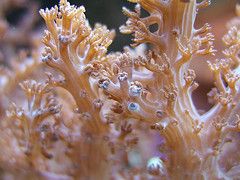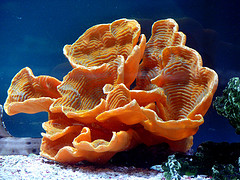Coral requirements in the home aquarium is exceptionally important as it is with anything else which is placed in the aquarium.
Corals are very sensitive creatures, much more so than fish and therefore their individual requirements need to be fully understood before even considering purchasing one.

The main coral requirements (listed in order of importance) are:
- Water quality
- Lighting
- Water movement
- Coexistence
- Food
- Respect
The first on the list of coral requirements is Water Quality – All corals demand very high water quality no matter what type of coral. This quality could be in the form of very low nutrient levels (nitrate and phosphate), correct calcium levels, correct pH level etc however there is one item which is optimum and that is stability.
Aim for the best water conditions that you can create and then make them stable.
The lighting needs to be correct for the aquarium however it also needs to be correct for the corals within the aquarium. The lighting needs to be of the correct strength and of the correct Kelvin.
Corals over many years have become accustomed to certain light levels and it is therefore important to ensure that when they are placed in the aquarium they are placed in a location where the lighting is correct.

For example many SPS corals require strong lighting and are therefore more suited to the upper regions of the aquarium whereas many LPS corals require lower light levels and are therefore more suited to the lower areas of the aquarium.
Of course the depth of the aquarium and the intensity of the lighting need to be taken into consideration.
Water movement is another one of the coral requirements which is of very high importance. It is actually a component of water quality however due to its importance it requires its own area.
Water circulation is a requirement with the aquarium for many things and corals are no exception. Corals require water circulation to provide them with food, remove waste, deliver oxygen etc.
As with lighting corals have become accustomed to various degrees of movement and aquarists have a requirement to attempt to replicate this as far as possible.
When it comes to water movement in a soft coral aquarium it is best to try to move water around the aquarium in the region of 10 times the water volume – for SPS corals this increases to 30 times if not more.
What this means is that if you have an aquarium which holds 100 gallons of water and are keeping soft corals then there is a requirement to move water around the aquarium 1000 gallons per hour.
Sounds like a lot but it is quite easily achieved with the technology which is not available to us. I will not cover the provisioning of water movement in the aquarium as again this is a large subject.
Coexistence is as the term states – the coral must be able to coexist in the aquarium with other corals.

The majority of corals have both defense and attack capabilities and some corals simply will not exist in the same closed environment.
It is therefore important to ensure that any potential new corals will exist with other corals already contained within the aquarium.
Feeding is another important area to consider. The corals will receive the majority of their energy from the light provided as long as they are placed in the correct location.
The remaining energy will be obtained through the corals actively feeding. The food the corals require again is dependent upon the species of coral however the majority of corals feed through their polyps.
It is not a definite requirement to feed all corals however it is good practice to understand the corals requirements when it comes to food.
Respect is a very general statement and one which actually covers the entire hobby.
All the fish, corals, invertebrates which are placed into the aquarium are placed into the aquarists care.
They are living organisms and therefore deserve respect.
This respect could be in the form of not moving them often, not neglecting them, providing their requirements etc but most importantly respecting them as another form of life which exists upon our planet.
Related Article:
 Live Aquarium Corals
Live Aquarium Corals
by Peter Cunningham of Aquarists Online
Return from Coral Requirements to Live Aquarium Corals
